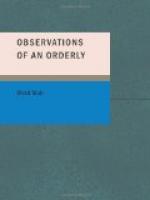The night nurses do not have a placid time of it if their patients are at the stage of recovery when spirits begin to rise and the early slumber-hour which the hospital rules prescribe is not welcome. String-actuated knaveries, more or less similar to the mouse-in-the-kitchen one, are always devised for the plaguing of a new night nurse. Sometimes in the dead of night, when utter silence broods over the ward, the gramophone will abruptly burst into raucous music: its mechanism has been released by a contrivance which gives no clue to the crime’s perpetrator. The flustered nurse gropes her way down the ward and stops the gramophone, every patient meanwhile sitting up in bed and protesting against her cruelty in having awakened them by starting it. Half an hour after the ward has quietened, the other gramophone (some wards own two) whirrs off into impudent song: it also has been primed. Nurse is wiser on future occasions: she stows the gramophones, when she comes on duty, where no one can tamper with them. Even so, she may have her nerves preyed upon by eerie tinklings, impossible to locate in the darkness; these are caused by two knives, hung from a nail fixed high up in the rafters. By jiggling a string, which is conducted over another rafter and down the wall to his pillow, the patient makes the knifeblades clash. Sometimes two strings, leading to different beds, complete this instrument of torture. After a determined search, nurse finds one string, and, having cut it, flatters herself that she has got the better of her enemies. Not a bit of it. She has scarcely settled in her chair again before the tinklings recommence. The second string is in action; and as she hunts about the ward for the source of the melody in the ceiling, muffled convulsions of mirth, from the dim rows of beds, furnish evidence that her naughty charges are not getting the repose which they require and to ensure which is part of the purpose of her presence.
A nurse who happens to be unpopular never has these pranks played upon her. They are in the nature of a compliment. Nor do they occur in a ward where there is a patient seriously ill. It is impossible to imagine war-hospital patients acting inconsiderately towards a distressed comrade. This observation renders all the more amusing the scandalised concern which I once beheld on the demure physiognomy of a visiting clergyman when he gathered the drift of certain allusions to a case on the Danger List.




